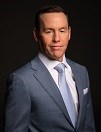Defense Counsel Journal
President's Page - Volume 89, Number 3
Volume 89, No. 3
July 10, 2022
 Spencer H. Silverglate
Spencer H. Silverglate
Spencer H. Silverglate
Spencer Silverglate is the 2021-2022 President of the IADC. He is a partner at Clarke Silverglate, P.A. in Miami, Florida. Spencer has a national reputation for handling complex business, insurance, and employment disputes and for defending high-stakes personal injury and product liability claims and mass and class actions.
IN THE ARENA
By Spencer H. Silverglate
“There are two great days in a person’s life—
the day we are born and the day we discover why.”
-William Barclay
I was feeling a bit uneasy when I sat down at the kitchen table of the modest Florida home. I was a young lawyer, and the deponent’s wife recently died in a horrific car wreck. The widower treated me with kindness, as though I had dropped in for a chat instead of a deposition.
“More coffee, Mr. Silverglate?”
“No thanks, I’m good. So, you say you have five children?”
“Yep, that’s right. And my wife home-schooled all of ‘em.”
Looking up from my outline, I couldn’t help but notice the children’s artwork hanging on the refrigerator. A crayon rendering captioned “I love you Mommy” seemed to reach out and punch me in the gut. The magnitude of the family’s loss was palpable. I had to remind myself that I had a client to represent and that the settlement demand, inflated by an unwarranted claim for punitive damages, was three times what the case was worth. I took a breath, returned to my outline, and continued the deposition.
My experience that day wasn’t unique; it’s played out every day by civil defense lawyers around the world. We handle difficult cases, sometimes for unpopular clients. And the adversarial system can be, well . . . adversarial. Judges can be inflexible. Clients can be demanding. Opposing counsel can be insufferable. Even our work colleagues can let us down. And the unending demand for billable hours can be overwhelming. Simply put, our work is hard, and the rewards often don’t seem to measure up.
Perhaps it’s not surprising, then, that lawyers experience among the highest rates of depression, anxiety, substance abuse, and relational strife. The statistics are dismal. Fortunately, though, lawyer well-being and work-life balance are garnering increased attention. Mental health treatment is less stigmatized today, and stress-management resources abound—everything from employer wellness plans and diet and exercise programs to affinity groups and mindfulness practice. Volunteer bar associations also have a role to play in attorney wellness. The IADC, for example, has been my 2,500-member “support group” for more than 20 years.
Yes, we civil defense lawyers have more mental health resources available to us than ever before, which is a very good thing. Still, I wonder if we’ve overlooked our most important resource. I wonder if we’ve underestimated our purpose.
The adversarial system of dispute resolution has not one side but two, and justice results only when both sides do their jobs. Without civil defense lawyers, there can be no justice, no rule of law, no civilized society. And no economy. No person or company would produce goods or services if they faced unchecked exposure for doing so. Without civil defenders, there would be no scientific innovation, no lifesaving treatments, no COVID-19 vaccines. There would be no place to work and nowhere to bank your money. There would be no cars, no airplanes, no spaceships. No iPhone. No Google. No Tesla.
Civil defense lawyers are the guardians of the galaxy. We are in the arena uncovering truth, revealing exaggeration, and, when necessary, exposing greed. Our mandate is to defend both the popular and the unpopular, alike. We manage sympathy, defuse hate, and advocate for just and fair results. We fight the good fight—even when the fight is unwinnable because if not us, then who? Above all, we strive to do our jobs without losing our humanity in the process.
I know it’s hard being a civil defense lawyer, but I take comfort in knowing that anything worthwhile is hard. We all pine for a life of relative ease and comfort, but when asked about life achievements, we invariably cite the challenges we’ve had to overcome: raising children, getting a degree, running a marathon, battling illness. Handling the tough case. Hardship is what gives context to joy. As the poet Wendell Berry has written, “The mind that is not baffled is not employed. The impeded stream is the one that sings.”
Besides, we would be dreadful souls if we didn’t face challenges. David Brooks points out in The Second Mountain that no one ever credited a beach vacation or a trip to Vegas with making them less shallow and self-centered. Character is forged in the furnace of adversity. And only adversity reveals greatness. Without Goliath, there can be no David. Without Frazier, there is no Ali. Without gravity, there is no Simone Biles.
Without an adversary, there is no adversarial system and no justice—for anyone.
I first became a civil defense lawyer without really thinking about it, letting time and events make the decision for me. But at some point in my career—I don’t know when exactly—I realized that this is who I am. At some point, I decided to own it. That’s when I found purpose in what I do, and that has made all the difference.
By the way, that fatal car crash case? Like most cases, it eventually settled, but only after we defeated the plaintiff’s motion for punitive damages and whittled the claim down to what it should have been from the start. When all was said and done, the surviving spouse shook my hand and thanked me for respecting his loss . . . and for being fair. The result was fair because there was not one side but two, and both did their jobs.
Back